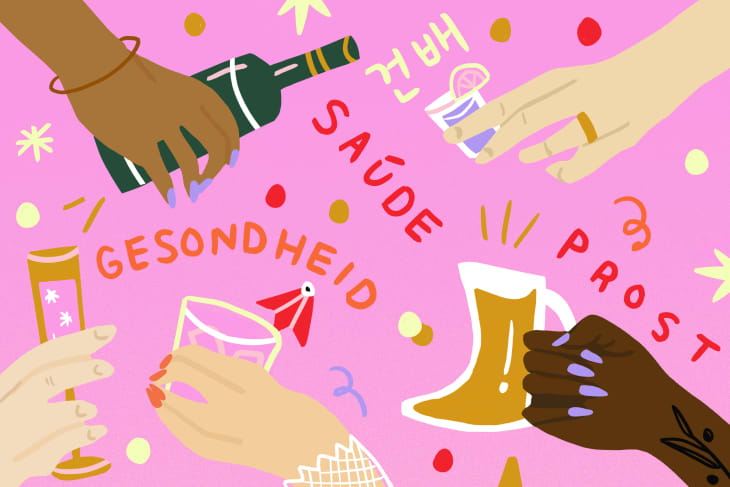How To Say Cheers In Korean
How to Say "Thanks" in thirteen Different Languages

New Yr'due south Eve means a lot of dissimilar things to different people across the globe, but one thing stays true for simply almost everyone: It's a time to gloat and reverberate on the year past and the one alee one time all the gifts have been given and vacation merriment has taken identify. And while stateside we like to band in the New year with champagne and a congenial "cheers," different cultures around the world have their own distinct celebratory toasts.
For more content like this follow
So in laurels of NYE, we rounded upwards 13 different "thank you"-mode greetings from beyond the globe. While they all don't literally interpret to "bottoms up," most are the go-to potable-cacophonous greeting for their corresponding region. From an old-school Spanish "salud" to a typical Korean toast, read ahead to see how to say "cheers" in ten different languages.
one. Cheers in Italian: Cin! Cin!
Pronounced: (cheen cheen)
Italians celebrate with the sound of spectacles clinking when they wish each other, "Cin! Cin!" It's a festive alternative to the more traditional "cheers!" which, in a like vein as Spain and other Western European countries, is "salute" or, "to your wellness."
2. Cheers in Irish Gaelic: Sláinte!
Ireland is another country that commonly toasts to i's health, with the term, "Slainte," which essentially ways, "to your wellness." In this light-green, rainy land, you may also hear the phrase, "sláinte is táinte," which roughly translates to "health and wealth."
3. Cheers in Turkish: Şerefe!
Pronounced: (cheh-reh-FEH)
At that place are several means to requite well wishes to your peers while drinking in Turkey (something that happens A LOT, apparently). But the virtually common way (and the easiest to pronounce, by far) is the term, "Serefe!" which means — you guessed it — cheers!
4. Thanks in Japanese: 乾杯 / Kanpai
Translation: "Cheers" or "Dry Loving cup" or "Empty the drinking glass"
In Japan, an enthusiastic "kanpai!," which translates to empty cup, isn't but a celebratory style to cheer, it'south a respected pre-drinking ritual. So New Year'due south Eve or non, don't even think nearly chugging a beer (or sake) in Japan before everyone at your table has said: "Kan-pie!"
v. Cheers in Castilian: Salud
While you might take already known that almost Castilian-speaking countries like to clink their drinks to a cheerful "Salud!," information technology seems the saying is popular for more than only a festive toast. Yous come across, "Salud" literally translates to "wellness" so information technology's used to wish others good health and prosperity—which means you're but as likely to hear someone say it after y'all sneeze every bit y'all would to ring in the New year's day.
6. Cheers in High german: Prost
If you lot've ever spent time in Germany (or an Oktoberfest effect for that matter), chances are you've heard the term "Prost" loud and clear. The nearly popular mode to toast in High german-speaking countries, saying "Prost" is all merely mandatory before knocking dorsum a beer.
7. Thank you in French: Santé! / À votre santé!
Pronounced: Sahn-tay / Ah vo-tre sahn-tay
Translation: "To your health"
Whether you lot're sitting adjacent to your boss or a stranger at the bar, if y'all want to make a toast in France, you say: "Santé!," which translates to "health." Okay to utilize in both formal and informal settings, yous tin also say "À votre santé!," which is the more than polite style to say "to your health."
8. Thanks in Portuguese: Saúde
Similar to the French "Santé!" and Spanish "Salud!," the Portuguese prefer to potable to each other's health by saying "Saúde!" instead of simply saying "cheers." So the next fourth dimension you're about to enjoy a cachaça in Brazil, call up to say "Saúde" before you lot kickoff drinking.
9. Thanks in Korean: 건배 / Geonbae
Translation: "Empty drinking glass"
In Korea, the discussion 건배 (or geonbae) literally means "empty drinking glass", making information technology similar to the stateside expression "bottoms up". And while the word implies that you should beverage the whole of your drinkable after toasting, it'southward not actually necessary.
x. Cheers in Swedish: Skål
Not only is it customary to say "skål" (i.eastward. "thanks") earlier toasting and taking a drink in Sweden, you're supposed to expect anybody in your party straight in the center—both before and after you take a potable—to practice proper Swedish social etiquette.
11. Cheers in Afrikaans: Gesondheid
Pronounced: Ge-sund-hate
Translation: "Health"
While the term "thanks" is commonly used in English-speaking parts of South Africa, the Afrikaan-speaking population has their own term to toast to: "Gesondheid." The word literally translates to "health" and sounds an awful lot like the German language word for "wellness" ("gesundheit"), which isn't all that surprising because the Afrikaans language has Dutch roots.
12. Thank you in Chinese (Mandarin): 干杯 / Gānbēi
Translation: "Thanks" or "dry cup"
Similar in audio to the go-to toast of the Japanese and Koreans, the popular way to cheer in People's republic of china is to say "gānbēi", which translates specifically to "dry cup."
13. Cheers in Greek: Υγεία / Yamas
If you e'er plan on toasting someone in Greece (and why the heck wouldn't you?), know that it's customary to clink your glasses and say "Yamas." The phrase literally translates to "health" and much similar the toasting traditions of nearby European countries, is a way to wish good health and prosperity to your drinking buddies.
Source: https://www.apartmenttherapy.com/how-to-say-cheers-in-different-languages-265546

0 Response to "How To Say Cheers In Korean"
Post a Comment